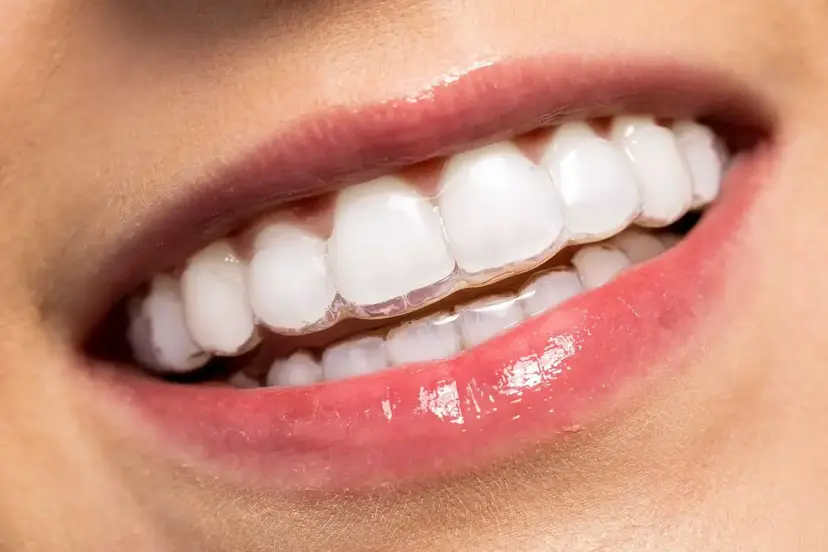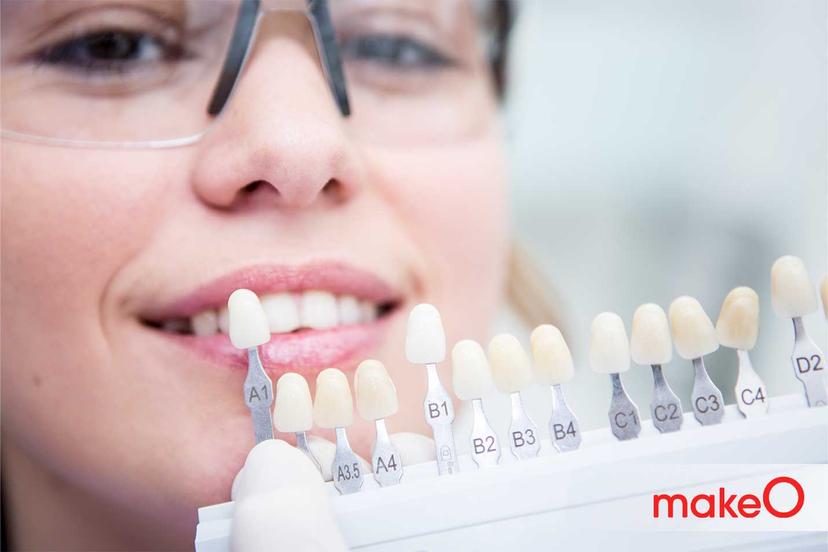MakeO blog
Teeth bleaching, or whitening, helps transform dark or discolored teeth into a brighter, whiter smile. Teeth can darken over time due to aging, food stains, or habits like smoking. Fortunately, there are effective solutions! Teeth whitening treatments, like at-home bleaching gels or in-office teeth whitening, are popular options for removing stains and restoring that youthful shine. While the results can last for months, they depend on your lifestyle choices. Whether you are a teen wanting to brighten your smile or an adult looking to reverse the effects of aging, teeth bleaching could be the perfect solution to boost your confidence and give your smile a fresh start.
Teeth Whitening Options
When considering solutions for brightening your smile, a common question that comes up is: How to whiten teeth? Well, there are two main choices you have for this: professional treatments at a dentist’s office or at-home teeth whitening products. Both make use of ingredients that bleach your teeth to give a lighter shade.
Professional teeth whitening uses stronger whitening agents, such as hydrogen peroxide, applied in a controlled environment by a dentist. This method delivers quick results, typically in one session lasting 20-30 minutes. The dentist ensures the gums and mouth are protected from the strong chemicals. In-office whitening is ideal for those seeking fast, noticeable results.
At-home whitening products, including strips, gels, and teeth whitening kits contain a gentler whitening agent, usually carbamide peroxide. These products are convenient for daily use and have lesser chances of irritation, they may take several weeks to show noticeable effects.
Teeth Bleaching for Children and Teens: Is It Safe and Effective?
Teeth bleaching has become popular among children and teens, and many parents wonder if it is safe and effective for them.
For younger children, teeth whitening is usually not a good idea. Baby teeth have thinner enamel, which makes them more sensitive to whitening products. So, using bleaching agents too early can cause tooth pain or gum irritation.3 Teens with all their permanent teeth in place can consider teeth whitening, especially if the discoloration is affecting their self-esteem. However, it is important to wait until their teeth are fully developed to avoid mismatched shades as new teeth grow in.
Even for teens, whitening should be approached carefully. Over-the-counter products like strips or gels may seem convenient, but they lack professional guidance. This can lead to uneven whitening, increased sensitivity, or even damage to the gums.
Dentist-supervised whitening is a safer option. A dentist can figure out what is causing the discolouration—whether it is from food, drinks, an injury, or something like too much fluoride. For external stains caused by things like coffee or soft drinks, professional whitening often works well. But internal stains, like those from medication or trauma, may need more advanced treatments such as micro abrasion or a combination of techniques. When done the right way, teeth whitening can be safe and effective for teens. The key is to talk to a dentist first. They can help decide whether whitening is the right choice and ensure it is done safely with minimal risks.
Adults and Teeth Whitening: What You Need to Know?
Over time, factors such as aging, thinning enamel, and habits like smoking or drinking coffee can cause teeth to darken. Thus, many adults seek teeth whitening options to improve the appearance of their teeth. Teeth whitening treatments such as bleaching are safe and effective for adults who are in good health. They help restore a natural, brighter look, contributing to a more polished appearance.
For older adults too, teeth bleaching is a suitable option to address discoloration. It lightens the teeth effectively, providing noticeable visual and functional improvements without damaging healthy tooth tissue.6 However, certain factors need to be considered before opting for teeth whitening treatments.
Generally, teeth bleaching is a safe and efficient procedure, but results may vary based on the concentration of ingredients. While normally the products used have safe concentrations, mild side effects like sensitivity or irritation can occur especially with stronger treatments. Professional supervision and strict adherence to instructions are recommended, especially for higher-concentration treatments, to ensure safety and long-term effectiveness. To maintain results, it’s important to avoid smoking and drinking staining beverages.
It is important to note here that whitening works only on natural teeth and will not affect dental work like crowns, fillings, or veneers. Before starting any whitening treatment, it is recommended to consult a dentist to ensure the method is suitable for your teeth and oral health. In all, bleaching is a safe, affordable, and non-destructive treatment for the adult population. As a result, it has become a significant part of modern oral care.
When to Avoid Teeth Whitening: Age-Related Considerations and Health Factors
Teeth whitening may not be suitable for everyone, and certain age-related and health conditions should be considered before undergoing the treatment.
Age Considerations: Teeth bleaching is not recommended for children and teenagers, especially those with a mix of baby and adult teeth. This is because their teeth are still growing, and whitening can cause sensitivity or damage to their dental health. For adults, bleaching is generally an effective and safe option, but it’s important to check for issues like sensitive teeth, thin enamel, or dental work. Always consult a dentist before starting.
Tooth Sensitivity: Sensitive teeth should be carefully considered before whitening. The bleaching agents used in whitening treatments can intensify sensitivity, leading to discomfort during or after the procedure. It is advisable to address tooth sensitivity first, possibly using a desensitising toothpaste, before proceeding with teeth whitening.
Gum Irritation: If you have gum disease, teeth whitening should be postponed. Whitening agents can irritate already inflamed or infected gums, causing pain, discomfort, or even worsening the condition. It’s crucial to treat gum disease before undergoing any whitening procedure to ensure the health of your gums and teeth.
Existing Dental Work: If you have dental restorations like crowns, veneers, or fillings, you can get teeth whitening done but remember these will not respond to whitening treatments, leading to uneven results. In some cases, these restorations may need to be replaced after the procedure.
Sensitivity to Light: People who are sensitive to light or taking medications that increase sensitivity should avoid whitening treatments involving light or laser components. These procedures could aggravate discomfort.
Pregnancy and Breastfeeding: Pregnant or breastfeeding women should avoid whitening products due to potential risks to both the mother and baby. It is always advisable to consult with a healthcare provider before undergoing any cosmetic procedure during these periods.
Health Conditions: Conditions like GERD (Gastroesophageal Reflux Disease) can increase tooth sensitivity, and using whitening treatments could worsen this.
You need to keep these things in mind and consult with a dentist to check if teeth whitening is suitable for you.
Conclusion
Teeth whitening can effectively brighten smiles for both teens and adults when approached safely and appropriately. While professional treatments offer quick and controlled results, at-home options provide convenience with milder agents. However, it is essential to consider age, dental work, and health conditions before whitening. For children and teens, caution is needed due to developing teeth, while adults should consult a dentist to ensure suitability. It’s important to address concerns like thinning enamel, existing dental work, and sensitivity while considering teeth whitening. By addressing individual needs and lifestyle factors, teeth whitening can enhance confidence and provide a safe, lasting solution for a brighter smile.
FAQs
1. Is teeth whitening safe for teens?
Teeth whitening can be safe for teens with fully developed permanent teeth, but it is best done under a dentist’s supervision to avoid sensitivity or gum irritation.
2. Can I whiten my teeth at home?
Yes, teeth whitening at home can be done using products which are available in the market like teeth whitening strips or gels. However, they make take a little longer to show results compared to professional treatments.
3. How long do teeth whitening results last?
Once you do teeth whitening, its effect can remain for a few months to years depending on your lifestyle. Avoid smoking and limit staining foods or drinks like coffee to keep your teeth white longer.
4. Is teeth whitening painful?
Teeth whitening may cause mild sensitivity or gum discomfort, especially with stronger treatments. But this is temporary only and you can use a desensitizing toothpaste to reduce pain.
5. Can kids get their teeth whitened?
Whitening is not recommended for kids as their teeth are still developing. Baby teeth have thin enamel, making them sensitive to bleaching agents, causing potential damage.
6. What causes teeth to stain or darken?
Common causes include ageing, poor oral hygiene, smoking, coffee, tea, and certain medications. External stains from food and drinks are easier to treat than internal discolouration.
7. Should I whiten my teeth if I have sensitive teeth?
If you have sensitivity, consult a dentist first. They can recommend suitable treatments, like lower-strength whitening agents, to minimize discomfort and avoid worsening sensitivity.
related categories
Related articles

Types of Braces: Removable vs Fixed Braces, Which is Right For You?

This Diwali, Smile Bright With makeO Teeth Whitening Kit

Dr. Pravin Shetty: Pioneer in Lingual Orthodontics & Innovative Smile Solutions
How do I Know I’m the Right Candidate for makeO toothsi Teeth Aligners?

